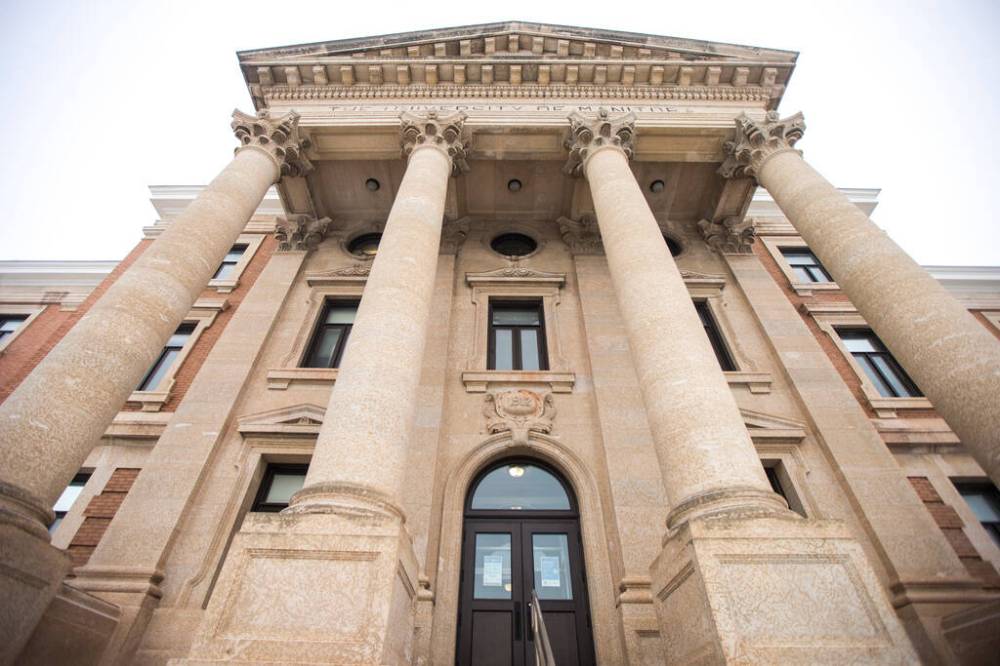U of M awarded $57M for research
Advertisement
Read this article for free:
or
Already have an account? Log in here »
To continue reading, please subscribe:
Monthly Digital Subscription
$1 per week for 24 weeks*
- Enjoy unlimited reading on winnipegfreepress.com
- Read the E-Edition, our digital replica newspaper
- Access News Break, our award-winning app
- Play interactive puzzles
*Billed as $4.00 plus GST every four weeks. After 24 weeks, price increases to the regular rate of $19.00 plus GST every four weeks. Offer available to new and qualified returning subscribers only. Cancel any time.
Monthly Digital Subscription
$4.75/week*
- Enjoy unlimited reading on winnipegfreepress.com
- Read the E-Edition, our digital replica newspaper
- Access News Break, our award-winning app
- Play interactive puzzles
*Billed as $19 plus GST every four weeks. Cancel any time.
To continue reading, please subscribe:
Add Free Press access to your Brandon Sun subscription for only an additional
$1 for the first 4 weeks*
*Your next subscription payment will increase by $1.00 and you will be charged $16.99 plus GST for four weeks. After four weeks, your payment will increase to $23.99 plus GST every four weeks.
Read unlimited articles for free today:
or
Already have an account? Log in here »
Hey there, time traveller!
This article was published 07/05/2024 (522 days ago), so information in it may no longer be current.
The University of Manitoba has received the largest federal cheque in its history to research vaccines and biomanufacturing as well as build two facilities.
The federal government will give $57 million to the U of M, in partnership with the universities of Alberta, Saskatchewan and Calgary.
“This groundbreaking investment will strengthen our ability to provide solutions to society’s most pressing challenges through research and get ahead of future pandemic threats,” said Annemieke Farenhorst, associate vice-president of research at the U of M, in a news release.

MIKAELA MACKENZIE / FREE PRESS FILES
The University of Manitoba has received $57 million from the federal government to research vaccines and biomanufacturing in partnership with the universities of Alberta, Saskatchewan and Calgary.
“It will empower our research community to develop next-generation vaccines and enhance biomanufacturing solutions — from fundamental research to preclinical testing — to accelerate innovation that will benefit Manitobans and Canadians.”
The money will boost research capacity in the life sciences and biomanufacturing sectors, the release said.
About $29 million will go toward the construction of a two-storey, 21,000-sq.-ft. biosecure facility to be erected on the university’s Fort Garry campus; $19 million has been earmarked to enhance research and training capacity for the development and delivery of vaccines for commercial application, the release says.
The second facility to be built, the Prairie One Health Emerging Respiratory Disease Centre, will be a containment Level 3 agriculture lab — a designation not currently available in Manitoba — and will be located at the Bannatyne campus downtown.
The laboratory will be used for pre-clinical vaccine testing against high-risk pathogens.
The money is part of the federal government’s biomanufacturing and life sciences strategy, a $2.2-billion program announced in 2021.
Projects selected for funding must enhance antibody discovery and therapeutics production, develop vaccines, establish better rapid diagnostic tools that can identify emerging pathogens, leverage artificial intelligence or other technologies to study bacteria, or establish a maternal-child health resource for disease surveillance and pandemic preparedness.
nicole.buffie@freepress.mb.ca

Nicole Buffie
Multimedia producer
Nicole Buffie is a reporter for the Free Press city desk. Born and bred in Winnipeg, Nicole graduated from Red River College’s Creative Communications program in 2020 and worked as a reporter throughout Manitoba before joining the Free Press newsroom as a multimedia producer in 2023. Read more about Nicole.
Every piece of reporting Nicole produces is reviewed by an editing team before it is posted online or published in print — part of the Free Press‘s tradition, since 1872, of producing reliable independent journalism. Read more about Free Press’s history and mandate, and learn how our newsroom operates.
Our newsroom depends on a growing audience of readers to power our journalism. If you are not a paid reader, please consider becoming a subscriber.
Our newsroom depends on its audience of readers to power our journalism. Thank you for your support.




